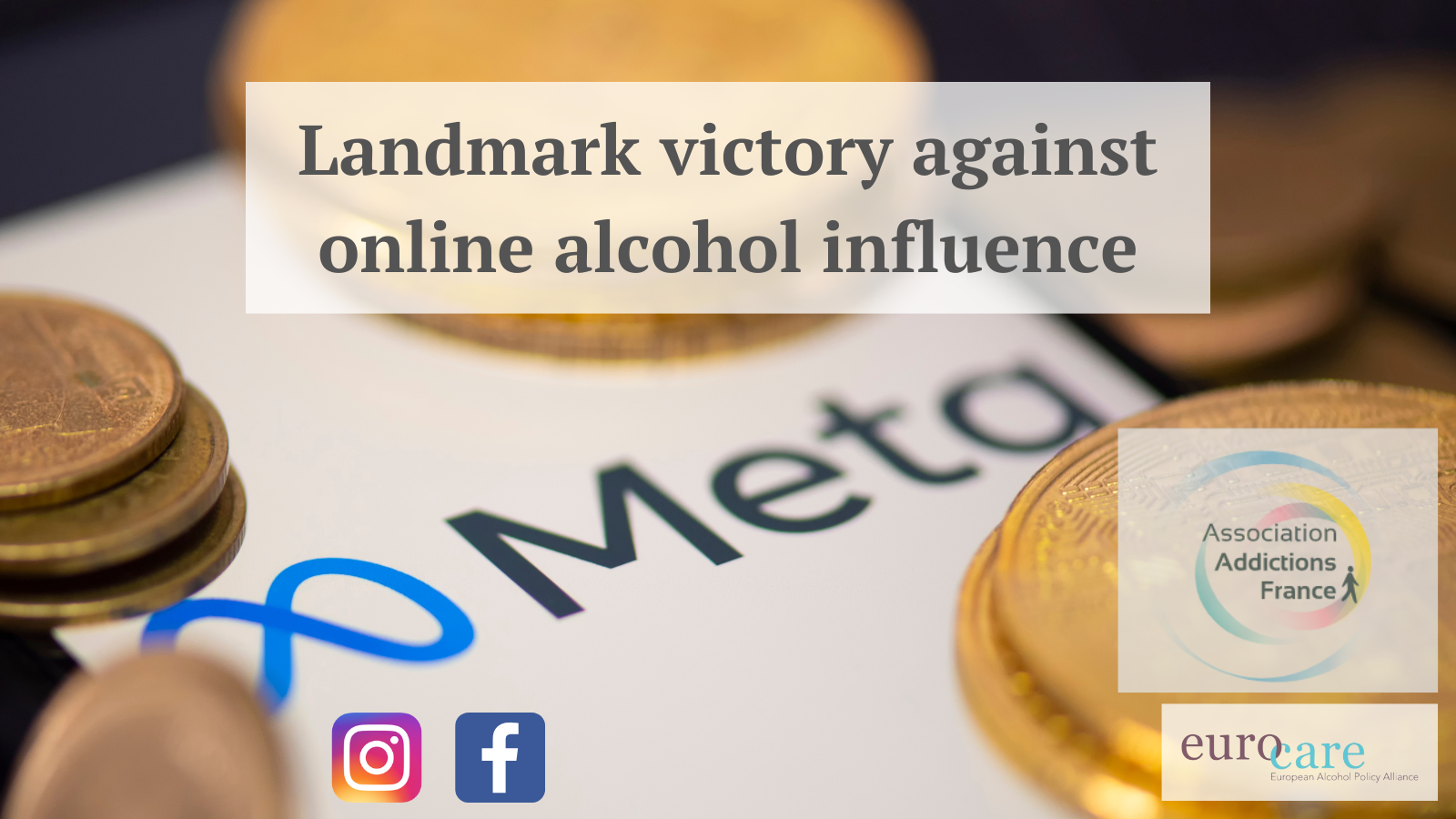A landmark victory against online alcohol influence
In early January a Paris Court ordered Meta to remove 37 posts found to be illegally promoting alcohol on Instagram, which Meta owns along with Facebook.
The court found the ads broke France’s “Loi Evin”, a law banning the improper promotion alcoholic drinks. The judge also ordered Meta to send the contact details of the posts’ authors with Eurocare member Addictions France so that they can be prosecuted.
Around twenty influencers made the posts, together reaching a total of around 5 million followers, many young and some under the legal alcohol drinking age.

A HISTORIC VICTORY AGAINST ONLINE ALCOHOL SPONSORSHIP
For 18 months Addictions France has been contacting influencers who publish content highlighting alcohol brands. The objective is, firstly, to make them aware of public health issues and, secondly, to remind them of the existence of the Evin law and so obtain the withdrawal of problematic content.
Some influencers respond well to the association’s approach, while others do not respond at all or refuse to recognise the illegality of their posts. This is now the reason why Meta is called into question: in the absence of withdrawal of content by influencers, the social network, Instagram in this case, as soon as it is informed of posts contrary to the law is required to delete them.
Meta did not respond positively to Addictions France's requests for the deletion of the posts leading the association to take the case to court. The Paris Court ruled in favour of Addictions France. The judge, despite Meta's opposition:
- Recognised the illegality of the alcohol postings
- Ordered the withdrawal of these posts
- Ordered the communication of the identification data of the authors
This ruling creates important new case law on the illicit sponsorship of alcohol on social networks. The decision echoes the recent survey by the Directorate General for Competition, Consumer Affairs and Fraud Prevention (DGCCRF), which found that 60% of the influencer profiles it studied acted illegally and outside any ethical and legal framework.
ILLEGAL POSTS REACHED FIVE MILLION FRENCH PEOPLE, MOSTLY YOUNG
Influencers have been at the centre of controversy for several years. Scam and frauds highlight a fundamental problem: It is possible for companies to improperly promote brands with almost complete impunity on social networks using influencer partnerships.
At Addictions France we deplore such practices which particularly affect the younger generation, who are the biggest users of social networks, especially Instagram.
Influencers encourage alcohol consumption by associating the product with their positive image. In some posts the consumption of alcohol is associated with a convivial moment between friends, which is illegal. Very often drinking is made synonymous with partying, sexuality, travel or vacations. Mandatory health messages are very often absent, whether in description or on the visuals.
Dozens of brands are clearly visible in the posts, both through hashtags and hypertext links, and in posted images: Gray Goose, Heineken, Laurent Perrier, Havana Club and Aperol, for example. For alcohol companies these indirect sponsorship techniques are a godsend. It allows them to shift responsibility to influencers who are not always aware of the Evin law, confusing the issue and obscuring where final responsibility lies.
REGULATING INFLUENCER MARKETING: A PUBLIC HEALTH NECESSITY
The Loi Evin has been constantly weakened since its creation, especially since the authorisation of advertising on the internet in 2009. It has now exploded thanks to influencers. While young people are much more receptive to advertisements from personalities with whom they identify, there is an urgent need to legislate and ban alcohol advertising by social media influencers.
“All stakeholders have a role to play in preventing young people, especially minors, from being encouraged to drink alcohol: influencers, alcohol companies, the networks themselves (here represented by Meta) and the government. Addictions France, at its humble association level, was only able to pinpoint around thirty problematic posts while there are surely hundreds published every day,” Franck Lecas, legal manager at Addictions France commented.
The Ministry of the Economy launched a public consultation aimed at regulating the commercial practices of influencers. In addition, several bills are now being developed to tackle this urgent problem. In this context Addictions France urges the government and parliamentarians not to underestimate the negative consequences of the promotion of products that pose health risks on social networks and to take all necessary measures to put an end to it.
Note: For more details on this topic and for contact details for Addictions France, please visit its original post.
